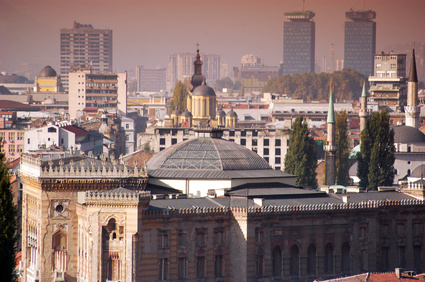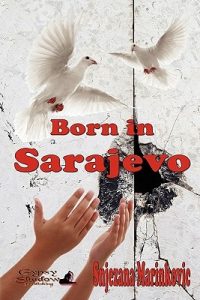Snjezana Marinkovic’s powerful memoir Born in Sarajevo tells two stories: (1) how the beautiful and venerable European city is destroyed by war and ethnic cleansing and (2) how the author loses her home, sees her friends killed or lost to her, and has her family torn apart in the conflict. Integrating the two narratives is a difficult obstacle, one the author hasn’t completely overcome.
Her personal story is compelling and heartbreaking. As a person of mixed heritage, she doesn’t belong with any of the warring groups. She lacks a secure place even within her family since her mother abandoned her and father remarried, and neither he nor her stepmother seems to care about her. Only her paternal grandmother, who raised her, gives her real love. The bond of affection between them is, for me, the soul of the story. It explains how the author survives so much cruelty and destruction without losing her compassion and hope.
Marinkovic is a passionate poet. Her poems, written while she was just a teenager, express her loneliness, anguish, and yearning for home. While a refugee in Czechoslovakia she writes:
I will draw a world without hunger,
without wars,
without anything that I can’t call by the name of love
I will draw the world for you, world for me
world with peace for everyone
The larger story, the tragedy of Bosnia, never quite comes into focus. It’s hard to blame the author since the history of the Bosnian war is complicated and largely unknown to most Americans. She gives a very brief explanation at the beginning, but it isn’t enough to orient readers. During her personal story – the body of the book – she relates horrific events. Often, though, I don’t have a clear picture of what’s happening in the larger context of the war. Granted, it’s difficult to move back and forth between her subjective experience and an objective account of the siege of Sarajevo and the ethnic cleansing in Bosnia.
In the concluding chapter, the author finally provides some history and analysis along with a plea for peace and understanding between all peoples. Though frequently moving, the chapter meanders from topic to topic and dissipates some of the energy created by her personal narrative.
But in the end, the strengths far outweigh the shortcomings of this memoir. Those of us who live in peace forget how fragile our world is, how suddenly it could be destroyed, and how human nature looks for someone to blame. And punish. Nine-eleven gave Americans a taste of this truth. Born in Sarajevo serves readers a bitter dish sweetened by Marinovik’s enduring belief in the goodness of people.








Leave a Reply
Want to join the discussion?Feel free to contribute!